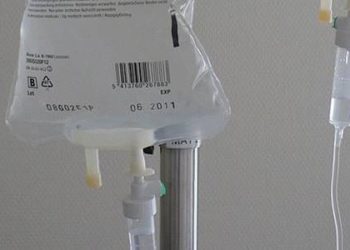Protease inhibitor-based antiretroviral therapy in HIV-infected children decreases malaria in Sub-Saharan Africa
Image: PD/CDC
Key study points:
1. Lopinavir-ritonavir-based antiretroviral therapy decreases the incidence of malaria by 41% in HIV-infected children in Uganda.
2. The 28-day and 63-day risk of recurrent malaria was significantly lower in the lopinavir-ritonavir-based group when compared to the group receiving nonnucleotide reverse transcriptase inhibitor-based (NNRTI) therapy.
Primer: The disease burden of malaria and human immunodeficiency virus (HIV) infection is overwhelming in sub-Saharan Africa where approximately 40 million people are living with HIV and more than 350 million people are diagnosed with malaria each year. Due to the geographic overlap between these two diseases they often coexist in many patients, especially children. Of the five malarial species that infect humans, Plasmodium falciparum is endemic in sub-Saharan Africa and thus the focus of much research. In vitro, antiretroviral protease inhibitors have activity against P. falciparum possibly due to the similarity between plasmodial proteases and HIV-1 proteases. Given the frequent coexistence of these two diseases, antiretrovirals may represent a valuable and cost-effective medication in the prevention of malaria in HIV-positive children. In this current study, the authors have proposed that protease inhibitor-based antiretroviral is superior to NNRTI therapy in decreasing the incidence of malaria in children in sub-Saharan Africa.
Background reading:
2. In vitro activity of antiretroviral drugs against Plasmodium falciparum
3. Unresolved antiretroviral treatment management issues in HIV-infected children
This [randomized, open-label] study: This study enrolled 170 HIV-positive children from the age of 2 months to 5 years of age. The children were randomly assigned to receive lopinavir-ritonavir-based antiretroviral therapy (ART) or NNRTI-based therapy and were followed for 6 months to 2 years. All children were started on daily malaria prophylaxis with trimethoprim-sulfamethoxazole. The children receiving lopinavir-ritonavir-based ART therapy had a 41% decrease in incidence of uncomplicated malaria as compared to those receiving a NNRTI-based regimen (1.32 vs. 2.25 episodes per person-year). There was also a significant decrease in recurrence of malaria among the lopinavir-ritonavir-based ART therapy group versus the NNRTI-based therapy group following treatment with artemether-lumefantrine (28.1% vs. 54.2%). There was no significant difference in adverse events although the lopinavir-ritonavir-based ART group trended towards having more serious adverse events (5.6% vs. 2.3%, p>0.05).
In sum: This randomized, open-label trial has shown that lopinavir-ritonavir-based antiretroviral therapy decreases the incidence of malaria by 41% in HIV-infected children in Uganda. This treatment regimen also demonstrated a significant decrease in the recurrence of malaria. While the exact mechanism of this protective effect is not known, it could be hypothesized that the lopinavir-ritonavir-based therapy had a direct effect on the plasmodial protease. Other hypotheses include delayed metabolism of the anti-malarial drugs or synergy between among the anti-malarial treatment and the lopinavir-ritonavir-based therapy. Future research further delineating the mechanism could lead to the optimization of antiretroviral therapy in children located in endemic areas of HIV and malaria.
While this seemingly protective effect of protease-inhibitor therapy decreased the recurrence and incidence of malaria, it did not show a significant reduction in the first episode of malaria. It is possible that the impact of this protection is dependent on the exposure to anti-malarial drugs, specifically lumefantrine, which was shown in a subanalysis to be in higher serum concentrations in the lopinavir-ritonavir-based ART group. Again, further research into elucidating the mechanism of action could lead to the optimization of therapy. Nonetheless, this study demonstrated a pivotal development in the minimizing of the disease burden of both malaria and HIV in endemic areas of Sub-Saharan Africa. Further work into describing the mechanism of malaria protection and the optimization of anti-retroviral therapy to maximize anti-malaria action will hopefully lead to even more efficacious prevention of malaria in HIV-positive children.
Click to ready the study in NEJM
By [BH] and [RR]
More from this author: Low pre-operative Hepatitis C viral load associated with better survival in hepatocellular carcinoma, Autologous bone marrow cell infusion following myocardial infarction elicits no improvement in left ventricular function, Family history is the strongest risk factor for development of Parkinson disease
© 2012 2minutemedicine.com. All rights reserved. No works may be reproduced without written consent from 2minutemedicine.com. Disclaimer: We present factual information directly from peer reviewed medical journals. No post should be construed as medical advice and is not intended as such by the authors or by 2minutemedicine.com. PLEASE SEE A HEALTHCARE PROVIDER IN YOUR AREA IF YOU SEEK MEDICAL ADVICE OF ANY SORT.






